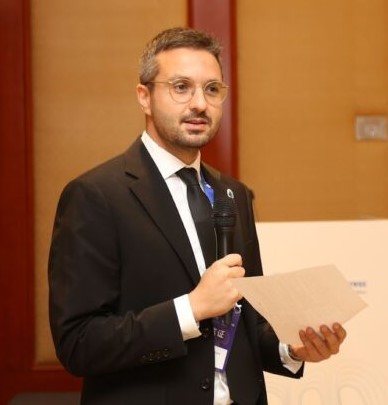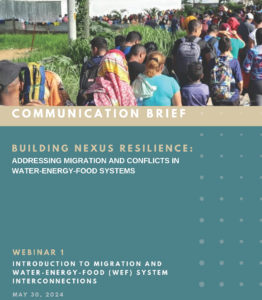Catalyzing knowledge sharing and dialogue at the intersection of migration and water-energy-food systems


According to the International Organization for Migration, there were over 280 million international migrants in 2020, a number influenced by both global crises such as conflicts, economic instability, and disasters, and positive factors like labor migration and free movement agreements. Migration drivers include water stress, extreme water events, energy poverty, and food insecurity. This surge in migration trends also challenges host nations, particularly in regions already facing resource scarcity challenges. Anticipated climate change and population growth will exacerbate these challenges, causing nonlinear impacts across water, energy, and food systems. Migration can also contribute positively to all aspects of economic, environmental, and social development and is key to achieving the Sustainable Development Goals (SDGs). The 2030 Agenda for Sustainable Development recognizes the intricate interdependencies among these resource systems, but their complex relationships with migration (forced, economic, rural-urban, internal, cross-border) remain insufficiently addressed. Understanding the connections between migration and key environmental resources (e.g., water, energy, and food) including how resource scarcity influences migration needs further study.
Existing Water-Energy-Food nexus models often fail to capture the nuanced interplay with conflicts and migration. Nexus communities from across the globe search for better tools to understand these trends and interconnections and guide anticipatory action toward improving the resilience of communities facing these pressures. Moreover, there is a need to understand the impact of the various underlying conditions and vulnerabilities on amplifying disaster risks related to water, energy, and food systems that contribute to migration. Also, connecting the vulnerability and resilience of resource systems (primarily water, energy, and food) with the nexus still needs to unravel solutions for long-term sustainable development.

“We’re hoping through this webinar series to make available a platform for knowledge sharing and dialogue about the multi-faceted solutions needed to address complex questions at the intersection of migration and water-energy-food systems. No single sector, stakeholder group, research discipline, or country can address these complex questions alone, underscoring the importance of having such a platform.”
Dr. Bassel Daher
Dr. Bassel Daher, Research Scientist at the Texas A&M Energy Institute, co-leads a Building Nexus Resilience Webinar Series to fill the gap. The series is a partnership between the Texas A&M Energy Institute, United Nations University Institute for Integrated Management of Material Fluxes and of Resources (UNU-FLORES), SustainFood, Nexus Net, PRIMA, and the International Water Resources Association. It aims to catalyze cross-disciplinary, cross-institutional, and international dialogues toward understanding the knowledge gaps and opportunities in taking a holistic, systems approach to addressing these tightly interconnected challenges.
Anticipated outcomes of the three-series event are to facilitate the development of a common framework and road map for integrating migration in nexus assessment tools. This would contribute to exploring and developing anticipatory tools and strategies incorporating migration dynamics into nexus assessments, aiming to guide policymakers, researchers, and practitioners toward evidence based, sustainable, and resilient solutions.

ADDRESSING MIGRATION AND CONFLICTS IN WATER-ENERGY-FOOD SYSTEMS
The first of three webinars titled Building Nexus Resilience: Addressing Migration and Conflicts in Water-Energy-Food Systems was held May 30, 2024 with 145 participants representing 70 countries. Presenters included Dr. Daher, Christina Daszkiewicz, Programme Officer on Migration, Environment, Climate Change and Risk Reduction for the International Organization for Migration (IOM); Dr. Nidhi Nagabhatla, Cluster Coordinator at the United Nations University Institute on Comparative Regional Integration Studies UNU CRIS); Prof. Ali Rhouma, Senior Project Officer at PRIMA; and Floor Brouwer, Adjunct Professor at the United National University Institute for Integrated Management of Material Fluxes and of Resources (UNU-FLORES). This inaugural webinar introduced key interconnections between migration and WEF systems and highlighted research gaps and opportunities.

COMMUNICATION BRIEF
Following the webinar, the organizing committee shared a Communication Brief featuring highlights and key takeaways from the presentations and discussions and links to the webinar recording and slides.
UPCOMING WEBINAR: INTEGRATING MIGRATION MODELS AND WEF ASSESSMENTS
The second webinar in the series titled, Integrating Migration Models and WEF Assessments, will be held September 10, 2024. Visit the Building Nexus Resilience website for details and registration.
